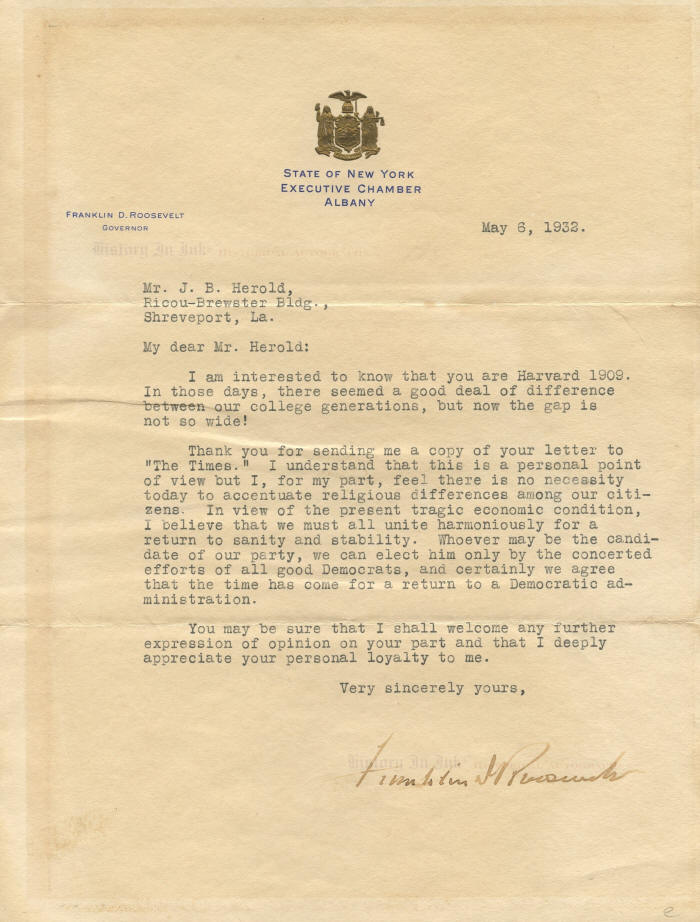1601601
Franklin D. Roosevelt
Scroll down to see images of the item below the description
“In view of the present tragic economic condition, . . .
we must all unite harmoniously for a return to sanity and stability.”
Franklin Delano Roosevelt, 1882–1945. 32nd President of the United States, 1933–1945. Typed Letter Signed, Franklin D. Roosevelt, one page, with integral leaf attached, 8” x 10½”, on stationery of the State of New York, Executive Chamber, [Warm Springs, Georgia], May 6, 1932.
This is outstanding commentary by candidate Roosevelt on the state of American society in the dark days of the Great Depression. Roosevelt, who had declared his presidential candidacy four months earlier, writes, in part: “Thank you for sending me a copy of your letter to ‘The Times.’ I understand that this is a personal point of view but I, for my part, feel there is no necessity today to accentuate religious differences among our citizens. In view of the present tragic economic condition, I believe that we must all unite harmoniously for a return to sanity and stability. Whoever may be the candidate of our party, we can elect him only by the concerted efforts of all good Democrats, and certainly we agree that the time has come for a return to a Democratic administration. / You may be sure that I shall welcome any further expression of opinion on your part and that I deeply appreciate your personal loyalty to me.”
As Roosevelt wrote this letter, the United States was nearing the depth the Great Depression. The statistics are appalling. Already by 1930, some 6,000 people were selling apples on the sidewalks of New York City for a nickel apiece, hoping to net $1.85 if they sold an entire crate. The next year, 2,294 banks failed, taking with them $1.7 billion in deposits, nearly $23 billion today. By 1932, more than 12,000,000 people were unemployed. The unemployment rate reached 24.1%, as compared a healthy 3.2% before the stock market crashed in October 1929, and would go yet higher in 1933. By May 1932, in New York City alone 750,000 people depended upon city relief, and another 160,000 were on the waiting list. It seemed as though soup kitchen lines grew longer daily. As the Governor of New York, Roosevelt could write here, without hyperbole, of “the present tragic economic condition.”
The Democrats would defeat President Herbert Hoover in a landslide in 1932, but it was hardly a foregone conclusion that Roosevelt would be the party’s nominee. At the end of April 1932, Roosevelt went to Warm Springs, Georgia, the site of the polio rehabilitation center that he founded, after losing the April 26 Massachusetts Democratic presidential primary election by a 3–1 margin to former New York Governor Alfred E. Smith, the party’s 1928 presidential candidate. On May 3, he lost the California primary to the Speaker of the House, John Nance Garner, a Texas favorite son candidate who had the backing of William Randolph Hearst. But the “block Roosevelt” forces could not coalesce in time. Just under two months later, after four long ballots beginning at 4:25 a.m. on July 1 and ending at 10:32 p.m. that night, Roosevelt won the nomination, with Garner as his vice-presidential running mate.
FDR’s correspondent here, Jacob Brooks Herold (1888–1968), practiced law in Shreveport, Louisiana. After a year at Tulane University, he earned Harvard’s four-year Bachelor of Arts degree in just three years. Roosevelt wrote that he was “interested to know that you are Harvard 1909. In those days, there seemed a good deal of difference between our college generations, but now the gap is not so wide!” After Herold returned to Shreveport, he studied law under in the office of a local lawyer and was admitted to the Louisiana state bar. Regarded as an authority on Louisiana civil and commercial law, he published five law books, including a treatise on Louisiana banking law, one on employers’ liability, and three editions of Interpretations of the Civil Code of Louisiana, one of which he later sent to Roosevelt.
Although this letter is not marked as such, Roosevelt undoubtedly wrote it from Warm Springs. FDR wrote several letters dated both before and after this one while on a trip to Warm Springs. See I F.D.R.: His Personal Letters 1928–1945, at 275–80 (Elliott Roosevelt ed., 1950). In a telegram from Warm Springs on May 20, 1932, with the strength of his physical condition to be President under scrutiny, Roosevelt challenged the publisher of the New York Sun to send a representative to Warm Springs to see for himself that Roosevelt did not, as the Sun had said in an editorial, have to visit Warm Springs because of his health. He wrote the publisher that he was “asking this of a friend in common decency. You would do the same if I charged publicly that you had to go to the Thousand Islands for two months each summer in order to keep alive.”
This letter is toned from prior framing, and Roosevelt’s 3¼” fountain pen signature is faded to brown but nevertheless is nicely readable. There are two horizontal mailing folds, neither of which touches the signature, and a couple of wrinkles that are not as apparent as the lighting from scan below suggests. Overall the letter is in very good condition.
Click here to see our large selection of Presidential items.







